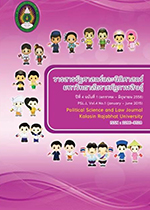สถานะของปัจเจกชนภายใต้กฎหมายระหว่างประเทศสมัยปัจจุบัน
DOI:
https://doi.org/10.14456/gjl.2015.4คำสำคัญ:
สิทธิและหน้าที่ของปัจเจกชน, กฎหมายระหว่างประเทศ, สิทธิมนุษยชน, พหุธรรมนูญนิยม, หลังสมัยใหม่, Individual ’s Rights and Duties, International Law, Human Rights, Pluralist Constitutionalism, Post-Modernismบทคัดย่อ
เป็นไปได้อย่างยิ่งในยุคสมัยใหม่ที่ว่า“อภิมหาตำนาน”ได้ก้าวเข้าสู่ยุคแห่งการเรียกร้องให้มีการรื้อทำลายและรวมถึงการสร้างระเบียบโลกขึ้นใหม่ในเวลาเดียวกันและที่ไม่ได้สำคัญน้อยไปกว่ากันเลยคือการตรวจสอบสถานะใหม่ของปัจเจกชนภายใต้กฎหมายระหว่างประเทศซึ่งควบคุมระเบียบโลกดังกล่าวอันเป็นเป้าหมายของบทความนี้ เพราะเหตุอันใดปัจเจกชนจึงสำคัญนัก เราอาจได้คำตอบสำหรับคำถามดังกล่าวจากการใคร่ครวญว่า มิใช่ปัจเจกชนภายใต้รัฐซึ่งเป็นนามธรรมเหล่านี้หรือที่ได้รับผลกระทบจากกิจกรรมของรัฐมากที่สุด ในประวัติศาสตร์ภายใต้กฎหมายระหว่างประเทศแบบคลาสสิก ปัจเจกชนมี “หน้าที่” หลายประการในขณะที่ไม่มี “สิทธิโดยตรง” เฉกเช่นที่บุคคลภายใต้กฎหมายระหว่างประเทศมี สิทธิของปัจเจกชนเป็นแต่เพียงสิทธิโดยอ้อม รัฐเท่านั้นเป็นบุคคลตามกฎหมายผู้ซึ่งต้องเข้าสวมสิทธิแทนปัจเจกชนเพื่อการเรียกร้องความคุ้มครองใดใด รวมถึงมาตรการทางกฎหมายต่างๆ ที่ รัฐเป็นผู้ใช้และเป็นผู้ทรงสิทธิโดยตรง ในเมื่อ “หน้าที่” เป็นสิ่งที่กำหนดแก่ปัจเจกชนตั้งแต่ไหนแต่ไรมา เพื่อที่จะเข้าใจสถานะของปัจเจกชนภายใต้กฎหมายระหว่างประเทศในยุคสมัยปัจจุบันนั้น จำเป็นต้องตรวจสอบและศึกษา “สิทธิ” ที่ปัจเจกชนมีภายใต้กฎหมายระหว่างประเทศ อย่างไรก็ตาม ตั้งแต่หลังสงครามโลกครั้งที่สองอย่างน้อยที่สุดเป็นต้นมา สถานะของปัจเจกชนภายใต้กฎหมายระหว่างประเทศเริ่มเปลี่ยนไป อันเป็นผลมาจากกระแสการคุ้มครองสิทธิมนุษยชนระหว่างประเทศได้ครองพื้นที่อันโดดเด่นในเวทีกฎหมายระหว่างประเทศ การศึกษาสถานะของปัจเจกชนผ่านทางสิทธิในบทความนี้ทำให้เราเห็นความก้าวหน้าบางประการที่ระบอบ กฎหมายระหว่างประเทศได้พัฒนาขึ้นมาเพื่อยกระดับสถานะปัจเจกชนให้เข้าใกล้ “สภาพบุคคลภายใต้กฎหมาย” มากขึ้น เว้นแต่ปัจเจกชนในระบอบของสหภาพยุโรปถึงกระนั้น ก็มิอาจกล่าวได้อย่างมั่นใจว่าสถานะของปัจเจกชนนั้นเท่าเทียมรัฐหรือองค์การระหว่างประเทศ ทั้งๆที่โลกได้ก้าวข้ามสู่ปริมณฑลที่ตัวแสดงสำคัญในเวทีระหว่างประเทศเป็นเอกชน และก็เอกชนอีกนั่นเอง ที่สวมบทบาททั้งเชิงรุกและรับสำหรับกิจกรรมระหว่างประเทศต่างๆเท่าเทียมหรืออาจจะมากกว่ารัฐด้วยซ้ำในบางมิติ แนวทางโพสต์โมเดิร์นหรือพหุธรรมนูญนิยมเพื่อการสร้างกฎหมายระหว่างประเทศใหม่เพื่อการยกระดับสถานะของปัจเจกชน หรือกล่าวอย่างปรมัตถ์คือสภาพบุคคลตามกฎหมายระหว่างประเทศอาจเป็นที่ต้องการภายใต้ระบอบกฎหมายระหว่างประเทศยุคสมัยปัจจุบันสถานะของปัจเจกชนจึงจะได้รับการตรวจสอบและนิยามขึ้นมาใหม่ นั่นมิได้เพื่อปัจเจกชนโดยส่วนเดียวแต่ยังรวมถึงสถานะของสังคมโลกโดยรวมอีกด้วยLikely to be mentioned of nowadays is the discourse that “Grand Narratives” are arriving in the age where there is cry of demolishing themselves and, as significantly as spontaneously, reconstruction of not only a new world order but as this article seeks to posit, individuals’ new status under international law. Why are individuals so important under international law? One finds the answer by pondering on the question of whether or not individuals within a state are most affected from whatsoever their states act in the international community. A state is just an abstract idea of a territory where certain individuals live their lives under the goal their state pursues and leads them and having imposed duties on individuals as can be seen through history, classic international law ensures some – though restricted – protection for individuals through substitution of individuals’ rights by the state and the legal measures taken by the state under international law on behalf of its nationals since individuals are not entitled to legal personality under international law – whether classic or neo. Apart from duties, individuals enjoy no direct rights under international law; thus, to understand the status of individuals at present, one has to assess their rights under the law. Our age sees a shift of status of individuals under international law regime when international protection of human rights has been taking its predominant place in international law, giving rise to a new regime existent at least after the World War II. A study of individuals’ status under international human rights law sheds light on progress international law has made so far for individuals’ status. However, irrefutable is that under examination of both customary law and the existing legal instruments including their mechanisms, the status of individuals has not emerged itself from the fragility and ambiguity found in the old regime – only bestowing rights to direct access to legal mechanisms and judiciary on states and international organizations rather than individuals despite the rights which individuals directly enjoys under the European Union international legal system. Postmodernist or Pluralist Constitutionalist approaches to reconstruction of international law to upgrade the status, or ultimately speaking, international legal personality of individuals may be required under present international law so that individuals’ status is to be reassessed and redefined, not only for their sake but also the global society’s.
Downloads
ดาวน์โหลด
เผยแพร่แล้ว
รูปแบบการอ้างอิง
ฉบับ
ประเภทบทความ
สัญญาอนุญาต
ลิขสิทธิ์ (c) 2017 วารสารการบริหารปกครอง (Governance Journal)

อนุญาตภายใต้เงื่อนไข Creative Commons Attribution-NonCommercial-NoDerivatives 4.0 International License.








